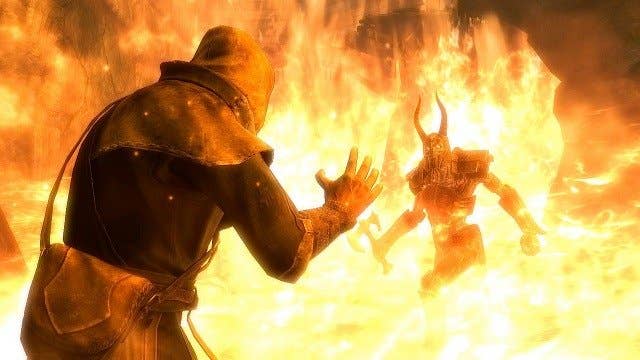Critical Consensus: The Elder Scrolls 5: Skyrim
Skyrim is another big, bold and buggy tour-de-force from Bethesda
"What should be thrilling fights in Skyrim are often weighed down by the same clunky melee system Oblivion suffered from. In fact, even the word "system" is pretty generous considering we're just talking about hammering on the right trigger. While Skyrim has expanded the series in almost every conceivable direction, its mindless melee still feels rooted in the past. Having a lightning bolt in your left hand helps, make no mistake, but it's no substitute for real variety in the swordplay."
"It's a recurring theme, actually. Depth in Skyrim is often sacrificed for scope. Most every individual system in the game has been explored more fully in other games, but there are just so many of them and so much flexibility, it's tough to get too perturbed."
We can pine for a game where every facet is honed to shining perfection, but Skyrim's incredible scope makes that near impossible to achieve - and very unfair to expect. Eurogamer's John Bedford focuses on the positive, highlighting the attention Bethesda has paid to things like the interface and shortcuts; details that won't fix deeper problems, but make them that much easier to look beyond.
"A process that would have been agonising in Oblivion becomes an open joy in the elegant design of Skyrim's interface," Bedford writes in his 10 out of 10 review, a rare honour from Eurogamer. "Bookmarked spells allow players to switch from bow to axe to healing powers with a flick of the d-pad as you adapt your combat to a dragon's path through skies and forests."

"Skyrim's perks system is presented with equal beauty in the constellation star-signs of the various paths, from Alchemy to Destruction magic or even the deeper virtues of Lock-picking. Go deep into shock perks to unlock the disintegration of the nearly-dead, or invest in Enchanting to add more than one effect to your equipment."
Skyrim's progression system makes fewer assumptions about your character, effectively allowing you to craft your hero through how you choose to play the game. Traditional levelling is streamlined: you now assign points to health, magic or stamina, and then select from a range of perks associated with each of those values.
"For those who want to experience more of any RPG than their tolerance for stat-planning will usually allow, there's great satisfaction to be had in making use of every game mechanic in order to increase your overall level. But those who wish to specialise and truly master a particular play-style through carefully planned perks will still feel compelled to do so with multiple characters. And then there's crafting.
"Though the crafting system in Skyrim amounts to little more than providing the raw ingredients and setting the process in motion, it gives a greater sense of ownership to that new blade. It's a system that will bring no end of satisfaction to the hunter-gatherer who wants something more in return for their efforts in the feral tundra or the sky-high mountain mines."
And then there are the dragons. Capturing the full sweep of what Skyrim has to offer is difficult, but these flying reptilian beasts have been at the forefront of Bethesda's marketing since the very beginning, reducing grown men to jelly with every bellowing roar. They also hold the key to one of Skyrim's more mysterious new abilities: Shouts, and you'll receive a new one for every slain dragon.
The illusion frequently falters - and sometimes completely breaks - but when it does you'll want to conspire with the game to pretend you didn't see
Edge magazine
For Edge, though, the dragons are problematic: "Large, aggressive and persistent, the epic rolling battles against these beasts show Skyrim at its most theatrical."
"Dragons handle the changing landscape confidently, staying airborne when they need to but coming in close when they have the chance. They expose the best and worst of Skyrim's combat. Waiting for them to land so you can batter them to death while staring at a screen full of scales is hard work, but archers and magic users will find a flying dragon presents an irresistibly tricky target."
"And when a defeated dragon finally crashes upon a barren hillside, its flesh melting off to reveal a skeleton that will remain there, a monument to your victory, for as long as you continue playing, it's a moment of emergent grandeur in what, at times, can feel like a clockwork environment."
Indeed, despite awarding the game a stellar 9 out of 10, the pitch of the reviews from other outlets suggest it will be in a small minority. Not only does Edge identify problems in areas that other reviewers praise without reservation, it more readily acknowledges the technical flaws that, for better or worse, are as much a part of the Bethesda experience as limitless choice.

"Skyrim still takes place in a world where a woolly mammoth can suddenly levitate a hundred feet into the sky and stay there. It still takes place in a world where trying to aid the city watch in a battle against a rampaging dragon can see you arrested and taken to prison - before the battle's over, mind - for striking one of the soldiers with a glancing blow. It's still a world where a nobleman will try, repeatedly, to enter a tavern, having forgotten to climb off his horse first."
"It's a world of clunking animation, of reused voice actors, of bandits talking over their own death throes. It's a world that's entirely engaging one moment and an utter farce the next. But it's a world that, providing you offer up your suspension of disbelief, delivers more than most games even attempt."
"The illusion frequently falters - and sometimes completely breaks - but when it does you'll want to conspire with the game to pretend you didn't see. You play on, for the moments of clever design, fortunate coincidence or downright inspiration that turn you from suspending disbelief into utterly convinced."
